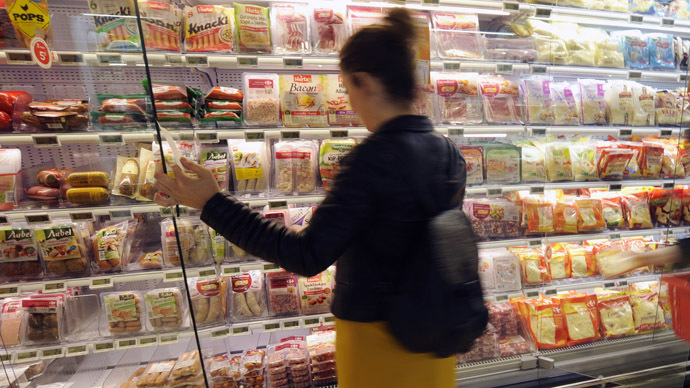Pesticides on fruits and vegetables could account for 49 percent loss in sperm

A major study of men’s sperm found that those who ate regular quantities of fruit and vegetables that had pesticide residue on them had half the sperm count of men who ate less, a new study showed.
READ MORE: Pesticides blamed for clinical depression in farmers
The Harvard University study, the first of its kind on the issue, analyzed sperm samples from 155 men who attended a fertility clinic during 2007-2012, Reuters reported. The men involved were attending a fertility clinic because they and their partners were unable to conceive, and were asked about the food they ate, including how often they ate fruit and vegetables like apples, avocados or cantaloupe.
Researchers then examined data from the US Department of Agriculture to measure whether the produce in these men’s diets contained a high, moderate or low amount of pesticide residue. They found that foods like peppers, spinach, strawberries, apples and pears rate high for pesticide residue, whereas peas, beans, grapefruits and onions rated lower to moderate.
Pesticides result in lower sperm counts: Men who ate fruits and vegetables with higher levels of pesticide residues… http://t.co/542KnVZDEQ
— Cambridge MA Buzz (@cambridgemabuzz) March 31, 2015
Men who ate the highest amount of fruit and vegetables with high levels of residue had a 49 percent lower sperm count, with a 32 percent lower percentage of normally-formed sperm than men who consumed a lower amount of produce, or less than 1.5 servings a day.
“These findings should not discourage the consumption of fruit and vegetables, in general,” said co-author Jorge Chavarro of the Harvard TH Chan School of Public Health.
READ MORE:Monsanto agrochemicals cause genetic damage in soybean workers – study
Chavarro said the problem is not the quantity of fruit and vegetables eaten, it is the quality. He said men who consumed high qualities of fruit and vegetables that have lower levels of pesticide residue have “normally shaped” sperm. Organic produce also helps.
Men who ate fruit and vegetables heavily laden with pesticides had an average total sperm count of 86 million sperm per ejaculation. Men who ate the least-affected food produced 171 million sperm per ejaculation. Previous studies have tied poor semen quality to occupational and environmental exposure to chemicals, but this latest study points to the effect of pesticides in the diet. Researchers said the results did not specify which pesticides were responsible but pointed to pesticide mixtures.
Eating Fruits And Vegetables Sprayed With Pesticides Might Lower Your Sperm Count http://t.co/mnA4pkJpZv#health#medical
— Senior Health Daily (@seniorhltdaily) March 30, 2015
“Given that pesticides are designed to kill and harm pest reproduction, it is not surprising that they are harmful to human reproduction,” study co-author Dr. Hagai Levine of the Icahn School of Medicine at Mount Sinai in New York told Reuters.
Chavarro and his team are also investigating whether women’s markers of fertility may also be linked to pesticides in the diet, he said.
In 2013, a related study of diet and sperm from Harvard’s School of Public Health – from the same study sample of men – showed that processed red meat consumption could also reduce sperm quality and quantity, and the study recommended increasing consumption of white and dark fish meat.












